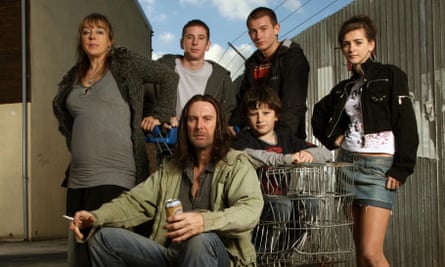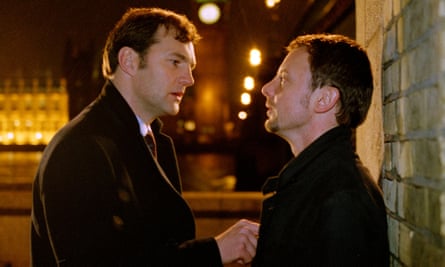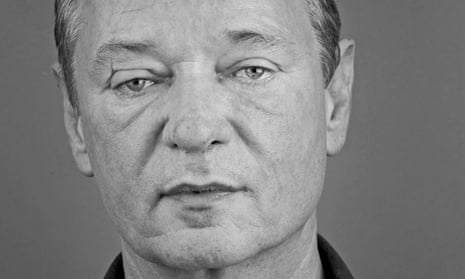The celebrated scriptwriter Paul Abbott, creator of Channel 4’s Shameless and No Offence and BBC1’s State of Play, is a skittish presence in person. There’s a frenetic energy to even his most casual actions, so that making a cup of coffee or smoking a cigarette can seem like a mischievous act of escapism.
His conversation comes in torrents of half-realised sentences, jokes, profane anecdotes and rat-a-tat laughter. Short in height and teenager-thin, he has burning blue eyes that appear troublingly at odds with the rest of his face, as if they’re seeing something that has nothing to do with what he happens to be talking about.
I meet him at his writer’s studio in that posh part of Cheshire where Premier League footballers tend to live. He has just completed a writer’s meeting for a new project he’s started working on about the Pendle witches, the infamous 17th-century witch trials in Lancashire, and he’s still buzzing.
“This thing’s only two days in but it’s as clear as a bell,” he says. “It’s just stunning for me, a really exciting sexy route in. I tried writing it other ways before, but there’s only one way to tell it… and it’s come out. Fantastic. Two days!”
Abbott is now 56, with a distinguished 30-year career in television, but he retains the enthusiasm – and physique – of a man half his age. Which is no mean achievement, given the life he has led.
Every writer is engaged in what John Updike called unpacking his own bag, but some have more baggage to attend to than others. With Abbott, it’s an airport carousel full, a massive load of experience that would have crushed most people, and very nearly put paid to him before he reached adulthood.
The bare bones of his biography have been laid out before, but they are hard to skip over. The second youngest of nine children, he was nine when his mother left the family home in Burnley. He didn’t know where she had gone, although it turned out that she had moved in with a man who had a son around Abbott’s own age.
His feckless father abandoned the family two years later, leaving Abbott’s eldest sister to raise the children in dire poverty. Abbott was raped by a stranger at 13 – some reports put his age at 11 – and tried to kill himself by jumping off a multistorey car park, but managed only to break his leg. At 15 he had a nervous breakdown, made another suicide attempt and was sectioned.
Afterwards he was placed with a foster family, started writing for magazines, won a short-story competition, began a psychology degree at Manchester University – but quit two years in, after he got Alan Bennett to sponsor a radio play he’d written – and then landed a job, at 24, on Coronation Street’s main writing team. By his late 20s he was earning £200,000 a year. And that was before he became really successful.
To complicate matters, Abbott is bipolar and has struggled with depression and periods of hyper-creativity. In 2008 he told an interviewer that he had consulted a hypnotist to help him stop having ideas for TV shows, because he found the endless flow debilitating. He also said he was seeing four different psychiatrists and psychotherapists a week.

Television is a medium that rewards success with pressing demands for more success. If someone is on a winning streak, then the work offers keep coming thick and fast. It’s why you see certain presenters or actors go through “hot” spells in which they appear to be in everything. And it’s why some TV screenwriters – Abi Morgan and Andrew Davies come to mind – can seem to have monopoly agreements on vast areas of drama.
Back in the 90s and 00s, it was Abbott who was at the top of every commissioning editor’s Christmas card list. For about 10 years from 1995, when he was writing Jimmy McGovern’s Cracker, Abbott was to scriptwriting what the fairytale goose was to golden eggs. In one four-year stint, he produced Clocking Off – the acclaimed series of stories set in a factory – the comedy series Linda Green, the stand-out conspiracy thriller State of Play, and the first two series of Shameless, his scabrously autobiographical soap opera about life on the lowest rung of society.
He was garlanded with awards by the industry, Hollywood came calling, and here in Britain he was viewed as a kind of hero of social mobility, someone who was born into poverty and chaos and through sheer strength of character and talent not only propelled himself upwards but also retained the humanity to celebrate and satirise his difficult past.
He became a visiting professor at Salford University, he was named the fifth most powerful person in television in an industry poll, and was rumoured to be the highest-paid writer in British television. He set up his own production company and was said to be writing a follow-up to the hugely successful State of Play.
But it never came. He was also supposed to be writing a 13-part series for the BBC set in the foreign office: it never materialised. There was a Hollywood adaptation of State of Play starring Russell Crowe, which Abbott was asked to write. He turned it down.
“I wish I had written it,” he says now, “because I could have written it three times better. But I got paid a lot on that, anyway.”
The truth is that Abbott has written very little, by his own once prolific standards, that has come to the screen in the last decade. There have essentially been two shows: Hit & Miss, a six-part Sky TV series about a transgender contract killer, and No Offence, an eight-part comic police procedural drama, which he began writing 10 years ago.
Both were well received by critics, but neither quite captured the public imagination in the way that Abbott’s earlier work had done. Now the second series of No Offence, which stars Joanna Scanlan as a plain-speaking and hard-living detective inspector, is about to be broadcast.
The first series was a strange confection, a kind of genre mashup, which attempted to ram together some conventional aspects of crime drama with broad comic characterisations and what Abbott refers to as “jet-black” humour. The disparate aspects didn’t always gel convincingly, but it possessed a brio and breakneck daring that carried the audience along. Abbott himself is enormously pleased with the result.
“When I pitched No Offence, it was a really hard thing to pitch,” he recalls, as we sit down in one of the studio’s several large rooms. “I couldn’t find my funny bone. I found what I wanted to say, but saying it to someone else industrially for money, it’s really hard. But I just went for it. I bounced off the wall so it was the most lunatic presentation, but that was the personality of the piece. They loved it and I don’t think they believed they’d get the script that matched the pitch, but we matched it. We really did.”
Abbott works with a team of writers in the American model. It’s something that enables him to cultivate talent, as well as offset the workload. Unlike many established writers, he’s excited and generous about the next generation of writers making its way.
“There’s brilliant stuff coming through, stuff like Fleabag, which shouldn’t have been made with all this [TV executive] scrutiny. Oh we’ve been waiting for that for a long time. Comedy always shows the way for drama at times like these when drama gets a little bit cake-mix.”
But the problem for him and his team in writing No Offence was where to place the comedy. In the first drafts of the first series they found themselves yo-yoing between comic lines and police procedure, until Abbott realised that comedy had to be implicit in the drama.
The setup of the show – a tough female boss, with two female sidekicks working as Manchester detectives – bore more than a trace of similarity to Scott & Bailey, written by his former Coronation Street colleague, Sally Wainwright. Did that bother him?
“Well, no,” he says, “because I was the first on paper, by five years. I’ve done this as a writer, when you’ve got really hot for an idea and they announce on Radio 4 that something’s coming up and you’re ‘Oh, it’s pointless.’ It’s so not. That means the vibe’s on for that subject. That’s when you should get in and write yours.”
Abbott is fiercely passionate about his work and says that he has often declined to sell something even when there were keen buyers. “Sometimes if you go into a pitch and everyone just loves it but they weren’t quite listening, I won’t sell that. Because if they don’t know what they’re buying, we’ll get the money but we won’t be supported. It’s cost us a lot of money.”
He tells me how pitching has changed down the years, and recalls being asked by one executive why he wanted to write about a younger man getting together with an older woman, as he did in his 1997 romantic drama Reckless.
“Because I was married to someone who was 11 years older than me, but actually it turned out after the divorce to be 13,” he says to me, in answer to that unnamed executive’s question. “Isn’t that pointless? Fucking pointless,’ he adds, switching focus now to his ex-wife. “And when I started to work on Coronation Street, [she’d say] ‘Who did you see at work today?’ Oh I wasn’t allowed to mention females. And then she’d ask me why I didn’t mention females – because she taught me how not to – and that drove me round the bend and that’s what split us up: her insistence that I would look for somebody younger. Well, I said, I wouldn’t look for anybody older, and the minute I said that, I knew it was over.”
His conversation is littered with these kinds of dramatic asides. With some writers there is a natural impulse to ask where their ideas come from. With Abbott you can almost see his subconscious bubbling away.

The older woman was his second marriage, following a short-lived teenage relationship. He then married a script editor, Saskia Downes, with whom he had two children. And he’s now married to his fourth wife, an American with whom he has a young son. He divides his time between Manchester, London, Los Angeles and a house in France. Shameless, which ran for nine years, helped make him a very wealthy man. He stopped writing for it after the fourth series, and lost patience with the direction it took.
“It should have stayed less hysterical, more like a saga,” he says. “If it followed that, it would have had a more gentle longevity. It started irritating me the amount of hysteria that had to crack in to keep it going. I got weary. I didn’t really watch it after a while. I didn’t resent it, because it paid us a fortune. But I was glad to see it off.”
While he often refers approvingly to earning money, Abbott has never been a writer in thrall to cash. Had he been, he would not have left the sinecure of script editor at Coronation Street. He had been on the show for almost nine years and was materially very comfortable, living in a large house with no mortgage and a steady and substantial income.
He recalls the moment he decided to leave the world’s longest-running soap. He was going off on holiday with Downes and their two children when their car broke down. So he decided to stay and write a Coronation Street script to pay for another car.
“That genuinely felt wrong,” he says. “You can’t buy a car for a week’s work, and it’s the wrong kind of week’s work. That was the point.”
He says his colleagues at Corrie were hooked on the money, embittered about their thwarted ambitions, but unwilling to leave. “Soaps are great,” he later said. “They teach you how to write a lot, but that’s it. It’s opposed to writing. It’s a succubus.”
At first, Abbott took a 75% pay cut to write original drama. But it was the beginning of a remarkable run of writing that seemed to spring, with barely any research, straight from his imagination. State of Play, the gripping 2003 drama that starred John Simm as an investigative reporter, Bill Nighy as his editor, and David Morrissey as an MP whose researcher is killed managed to capture the atmosphere and workings of a newspaper without Abbott ever having set foot inside a newspaper office.
He wrote it first and then sought technical advice from journalists. The late Simon Hoggart of this parish told him that it was “ridiculous” there was no subeditor in the newsroom, so Abbott wrote one in.
But for him, such details are secondary. The most important thing is to make the world he creates seem real, rather than be led by reality. It’s why he ignored the paediatrician employed to advise him on Children’s Ward, one of his early writing jobs, and simply made up illnesses and the drugs to treat them. “Nobody complained,” he laughs.
He took the same approach on No Offence – a project he rediscovered in his garage drawer – of coming up with the stories first and then making them fit. His original idea centred on a police station in which the detectives and uniformed officers worked together. But his police adviser told him that detectives don’t work with uniformed police.
“That was the whole premise of the show. So I said: ‘What else have you got?’ Oh, he said, unless it’s an integrated policing unit. There you go, but that took about five hours to find out.”
He does a lot of his writing out of the country, in France and in Los Angeles, a city he enjoys because he doesn’t feel caught up in the film business.
“I don’t really operate at that agency level,” he says. “I shouldn’t say it, but I don’t really want an agent because you’ve only got to go out to dinner with them and tell them lies about what you’re not doing. I don’t want to be as desperate as they make you feel.”
A few weeks later in London, I watch a screening of the first episode of the second series of No Offence. It seems tighter than the first series, a little less intrusively jokey. Afterwards, Abbott takes part in a Q&A with some cast members, including Joanna Scanlan and Will Mellor. He tells the audience about his struggle to locate the tone for the show second time round. “I thought it would be easier on the second series, but it was a narrow bandwidth to find again.”
He says he’s very proud of its originality. It is unmistakably the work of Abbott, with all his trademark riotous dialogue and jackknife turns. But I’d still love to see him return to the politics and media nexus he explored so memorably in State of Play. Those twin worlds, and our world along with it, have changed beyond recognition in the past 14 years, and it would be fascinating to see Abbott set his dynamic vision on them once more.
In a way, 2011’s three-part series Exile, which Abbott co-created but did not write, was a return of sorts. It featured John Simm again, this time as a disillusioned journalist who loses his job and goes back home to his father, who’s suffering from Alzheimer’s. It wasn’t, though, the State of Play 2 that Abbott has referred to on and off for many years. I ask him if he still intends to see that job through.
He gives me a wary look. “We’ve talked about that,” he says, eyes down. “It’s dead sexy. It’s just apportioning the next projects. It’s a prospect.”
That’s all he’ll say on the subject. But he looks up and those penetrating blue eyes stare off into the distance, as if catching sight of a vivid scene he hasn’t yet written.
“I feel as energetic as ever,” he says. Commissioning editors, stay tuned – and don’t forget to listen.
No Offence returns to Channel 4 on Wednesday at 9pm

Comments (…)
Sign in or create your Guardian account to join the discussion